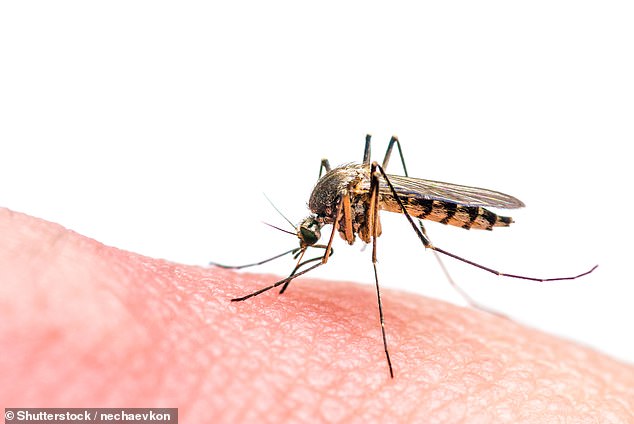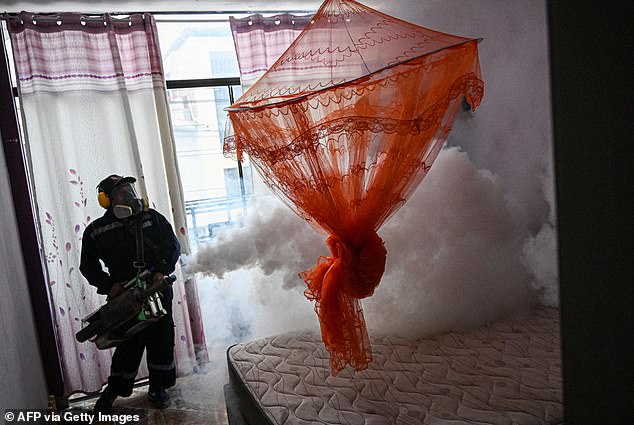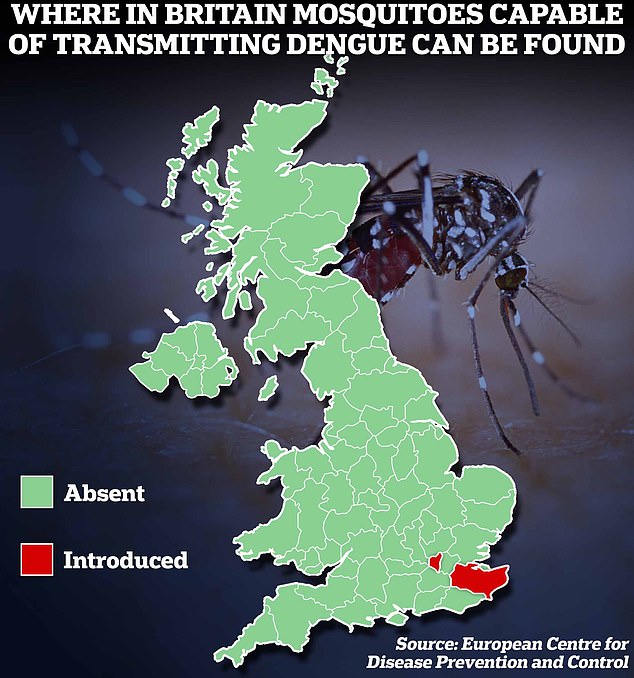Dengue fever warning: As the tropical disease spreads across Europe, we reveal the early warning signs of a deadly virus you should NEVER ignore
As cases of potentially deadly dengue spread across Europe, sparking fears of a rise in British cases, experts say holidaymakers should be aware of the signs of the disease both on holiday and at home.
Last year, a total of 130 cases of the disease, which was previously confined to the tropics, were recorded in the EU and EEA, almost double the number compared to the previous year.
And health officials fear this is part of a growing trend. The number of cases for 2023 and 2022 is a huge spike compared to the 73 cases recorded on the continent between 2010 and 2021.
Dengue is a potentially fatal virus transmitted to humans by infected mosquitoes and was historically known as ‘breakbone fever’ in the 18th century because of the severe pain it can cause in the muscles and joints, one of its symptoms.
Although normally endemic to Central and South America, the Caribbean and Southeast Asia, experts have warned that climate change is making the Mediterranean more hospitable to the mosquito species that transmit the disease.
Dengue is a potentially fatal virus transmitted to humans by infected mosquitoes and was traditionally known as ‘breakbone fever’

Dengue is normally transmitted through mosquito bites, but exposure to infected blood can also cause people to contract the virus
Symptoms typically appear between four and 10 days after being bitten, meaning holidaymakers may still need to watch for signs of dengue upon return to Britain.
Common symptoms of a dengue infection usually manifest as flu-like symptoms.
Typically, patients suffer from fever that lasts between two and seven days. During this period the fever may peak, decrease and then peak again.
This may be accompanied by redness in the face during the first few days.
Other common symptoms at this stage include severe headaches, pain behind the eyes, muscle and joint pain – giving the disease the name ‘bone breaker’ – nausea and vomiting and swollen glands.
Within three to seven days after the fever starts, a flat, red rash may appear over most of the body – thought to be caused by an immune system response to the virus. This itches in about a quarter of patients.
Although less common, bleeding gums can also occur.
Britons with dengue symptoms who have been to an area where the disease is common are advised to contact their GP or NHS 111 for an urgent appointment.
This is due to the risk of a potentially life-threatening complication that usually strikes just as people start to feel better.
Although people infected with dengue recover after one to two weeks, there is a chance that some will develop a much more severe form of the infection.
This is called ‘severe dengue’. This is a life-threatening condition that develops in approximately one to twenty cases (five percent) of people infected with the virus.
Experts estimate that this version of dengue kills half of the people who suffer from it.
Symptoms of severe dengue include severe stomach pain, repeated illness, rapid breathing, bleeding gums, nosebleeds, extreme fatigue, restlessness, and blood in your vomit or stool.
These usually occur 24 to 48 hours after the first wave of dengue symptoms have passed and people start to feel better.
It is a serious medical emergency and people with symptoms are advised to call 999 or go to A&E as soon as possible.
It is known that people who have previously had dengue are at greater risk of developing a severe form of illness in the future due to subsequent infections.
It also advises that people who are more vulnerable to dengue, such as young children, the elderly, pregnant women and people with weakened immune systems, should avoid traveling to areas where the virus is present.
Dr. Simon Clarke, an infectious disease expert at the University of Reading, told MailOnline that Britons traveling to the continent should be aware of possible dengue symptoms even after returning home.
“Dengue fever is something traditionally associated with more unusual and exotic destinations, but recently France, Italy and Spain have recorded multiple infections, so travelers from Britain should be more aware of this potentially fatal infection,” he said.
‘Travellers should be made aware not only of the increasing risk, but also of the symptoms, the four to 10 days they can take to appear after someone has been bitten by an infected mosquito, and the importance of seeking medical advice if they that they have contracted dengue.’
He added that as climate change is predicted to make the mosquitoes that transmit dengue more common in Europe, controlling the insects would be an increasingly important consideration for holiday destinations.
Professor Ian Jones, a virologist in Reading, also told this website that while there is no need to reconsider holiday plans yet, dengue is likely to worsen in Europe.
The risk of contracting dengue in Europe remains low. “Many more cases are being imported from countries where the infection is common, but numbers are increasing, and we should expect this trend to continue in the short term,” he said.
‘A number of viral infections, including dengue, are transmitted by insects and as climate change increases their range, the incidence of viral infections also increases.’
He urged holidaymakers to take sensible precautions to reduce the risk of contracting the virus when traveling in known dengue areas.
Prevention is considered the best way to avoid dengue and people visiting areas where the disease is common take steps to reduce the risk of mosquito bites.
These include wearing long-sleeved clothes and trousers, using insect repellents, keeping windows closed without mosquito screens in their accommodation and sleeping under a mosquito net.
People should be especially careful in the early morning and early evening, when mosquitoes are most active.
In Britain, transmission of dengue is not currently considered a risk, although mosquitoes capable of transmitting the virus have previously been found in Britain.
Normally, people with dengue cannot transmit the virus directly to others, although mosquitoes can bite them and then infect other people.

Dengue fever is a viral infection transmitted by mosquitoes that has traditionally been limited to tropical or subtropical climates. It infects an estimated 400 million people per year. In the photo: a house in Peru being fumigated against mosquitoes to prevent the spread of the disease
However, very rare cases have been recorded where dengue was transmitted through contact with infected blood through transfusions or organ donation.
In 2023, a total of 634 cases of dengue were recorded by the UK Health Security Agency (UKHSA).
These were all imported cases, where someone became infected abroad and became ill upon return.

This map shows areas where mosquitoes that can transmit dengue have been introduced into Britain. These populations have not yet established a permanent presence in Britain, but experts have warned that climate change means their spread is inevitable
UKHSA officials warned that the figure is now approaching pre-Covid levels after cases fell naturally during the pandemic due to travel restrictions, and urged travelers to be vigilant.
Experts have previously warned that dengue is among the diseases that could take hold in Britain due to a ‘slow march north’ of insects due to climate change.
Globally, there were 6.5 million reported cases of dengue in 2023, of which 7,300 resulted in death in 2023, according to the World Health Organization (WHO).
However, the WHO says models show there are 390 million actual infections annually.
